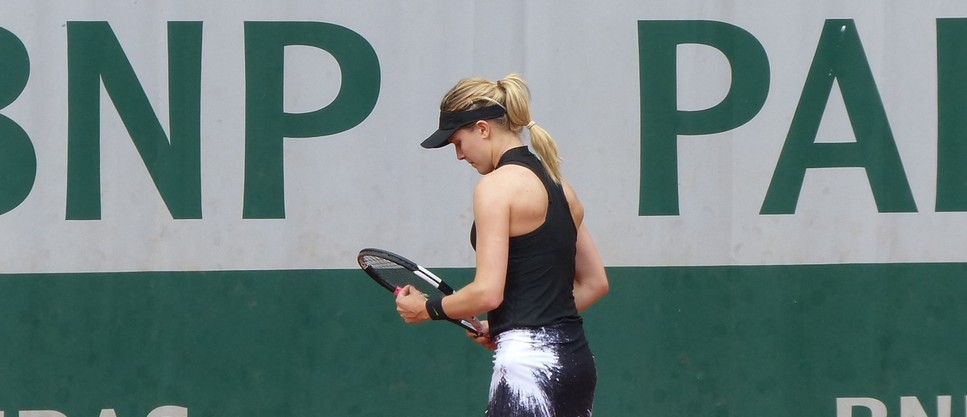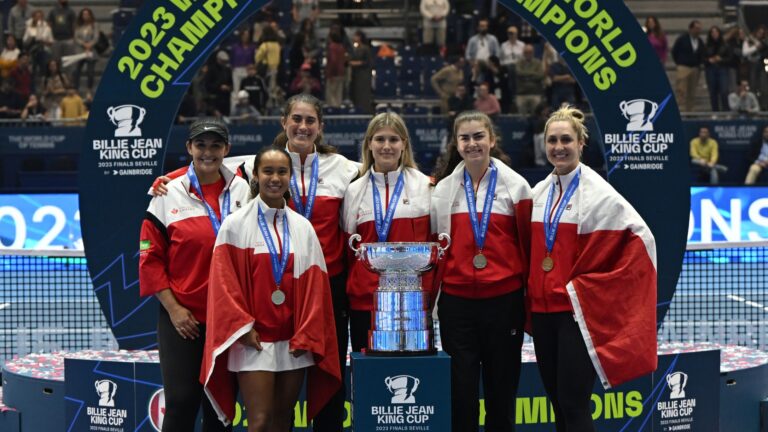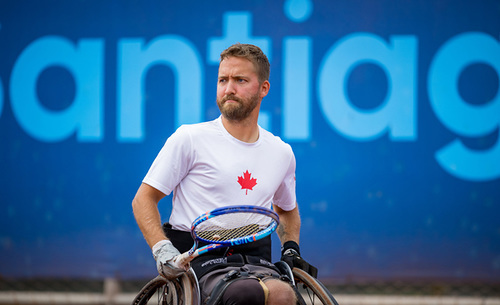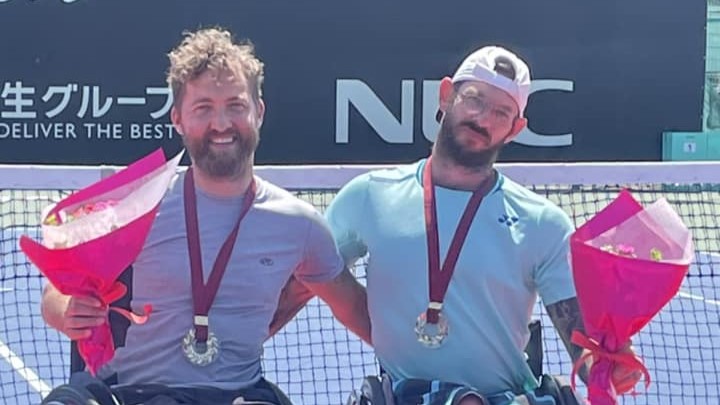
It’s never fun for a player to lose a tennis match but it’s even less fun when she or he knows it’s not physically possible to give a max effort.
Genie Bouchard was beaten 6-3, 6-0 by 17th seed Anastasija Sevastova of Latvia in the second round of the French Open on Thursday and certainly wasn’t anywhere near her best form. But on the other side of the equation Sevastova played well and gave Bouchard few openings to build belief or momentum.
Bouchard has been doing her best to rehab and get ready for the French Open, and did manage to win a round on Tuesday against No. 72-ranked Risa Ozaki of Japan. But she paid a price for that. “Yesterday (Wednesday) I could barely practice, so (I) just tried to play because it’s a Slam,” she said at her media conference after losing on Thursday. “I really didn’t feel like I was moving well – really not near 100 per cent. That affected my whole game and allowed her to control the ball.”
One of the ways Sevastova controlled it was with drop shots – scoring nine winners with precision execution. “Sevastova has magnificent touch and, whenever Eugenie hit short, she really disguised the drop shot and hit it very well,” said Canadian Fed Cup captain Sylvain Bruneau.
Sevastova denied there was any intent to try to exploit her opponent’s weakness – Bouchard twisted her right ankle chasing a drop shot in practice last week before the WTA event in Nuremberg, Germany, and her movement was restricted during her pre-tournament practice sessions in Paris. “It wasn’t part of a plan,” the 27-year-old Latvian said about the drop shots. “I usually play drops shots and just do it instinctively.”
On better days, Bouchard (after a drop shot from Sevastova above) would likely have moved better to get to the drop shots and even have been better at anticipating them. “Very frustrating,” was her two-word reaction to a question about how frustrating the Sevastova drop shots were.
It’s one of the toughest things about sports – the fact that two individuals or two teams cannot always be physically or mentally prepared to compete at their best. Sevastova’s response when told that Bouchard had difficulties with her movement, was, “I thought she moved fine in the first set – the second set went pretty fast (18 minutes.)”
One hesitates to give too much credence to stats when the result of a match was affected by an outside factor such as a player’s fitness, but they did show the one-sided nature of the contest – Sevastova was 21/11 winners to unforced errors while Bouchard was 10/22.
There was really only one juncture when Bouchard looked to have a chance – when she had a point to level the opening set at 3-3 after Sevastova (above looking up during pre-match coin toss) had a rare misfire with a drop shot. But she couldn’t convert and the Latvian soon led 4-2 and never looked back.
“Not great movement and too many unforced errors,” Bouchard summed up about her performance but did acknowledge Sevastova, adding, “and her mixing it up and making it even more difficult for me I think was, in the end, what happened.”
Looking back at the whole 2017 Roland Garros experience, Bouchard said, “it’s bad luck having an injury like this the week before a Slam.”
But she managed to put things in perspective a little later, declaring, “I think everything happens for a reason, so I’ll stay positive. I gave all I could the past two weeks and took it day by day to see what happened.”
She dismissed the idea that she might have regrets about deciding to play. “Not at all, I did more than I planned,” she insisted.
Next on her tournament schedule is the grass-court event in Mallorca starting on June 19th – two weeks before Wimbledon. “I’ll take a little time off now and make sure I do everything right,” she said. “The plan is to play Mallorca.” But that would be after what she said was going to be “rehab, rehab, rehab.”
Now, as is the case with many non-European players at this time of year, she has to decide where she wants to be. While she was not definite, she sure sounded like her mind was made up. “I think my heart tells me to return to North America,” she said.
RAONIC IN FRIENDLY CONFINES
Milos Raonic will play his third-round match against Guillermo Garcia-Lopez of Spain on Court 2 on Friday – the second match following a women’s match between Lesia Tsurenko and Jelena Ostapenko. That should be at roughly 7 a.m. ET in Canada. But there’s rain in the forecast for Paris so there could be some delays.
Court 2 seems to be the Canadian court at this year’s French Open – all but two of the six singles matches played so far by Raonic, Genie Bouchard and Francoise Abanda have been in the quaint 1,445-seat arena.
The winner of Raonic – Garcia-Lopez (Raonic leads the head-to-head 2-0 and has not lost a set to the 33-year-old Spaniard) will face whoever emerges from Friday’s opening match on Court 1, which is No. 11 seed Grigor Dimitrov vs. No. 20 Pablo Carreno Busta.
SHAMASDIN INTO THIRD ROUND DOUBLES
Adil Shamasdin and partner Andres Molteni of Argentina moved into the third round of the doubles on Thursday with a 7-5, 7-6(9) victory over No. 12 seeds Marcin Matkowski of Poland and Edouard Roger-Vasselin of France.
The Canadian/Argentine pair trailed in both sets – 5-3 in the first and 5-2 in the second but rallied to win.
In the second-set tiebreak, Shamasdin and Molteni had a match point but Molteni missed a volley that tipped the net and then landed wide. The 29-year-old from Buenos Aires then saved a set point for the opposition with a big service winner.
Shamasdin and Molteni got to a second match point when Roger-Vasselin blasted a service return right at Shamasdin and he reflexed a volley winner. The match ended on the next point when Shamasdin hit a low service return and Roger-Vasselin volleyed into the net.
On the penultimate point when Roger-Vasselin went at Shamasdin, it could well have been because the 34-year-old from Pickering, Ont., is so active that the Frenchman decided the safest thing was to hit right at him. When it was suggested to Shamasdin that he might have been getting in Roger-Vasselin’s head a little bit, he replied, “I hope so. That’s my job, that’s what I bring to this team. I try to move quite a bit – make my moves at the net and Andres he does his thing at the baseline. I think that’s why we’re successful – he does his thing and its two different types of tennis really.”
In the third round – aiming for his second career Grand Slam quarter-final after reaching the Wimbledon quarter-finals with Briton Jonathan Marray last summer – Shamasdin, with Molteni, will face another unseeded pair, Julio Peralta of Chile and Horacio Zeballos of Argentina.
DABROWSKI WINS DOUBLES OPENER
Gabriela Dabrowski and Chinese partner Xu Yifan, seeded ninth, won their first-round doubles match on Thursday defeating Sam Stosur of Australia and Zhang Shuai of China 6-2, 6-3.
Dabrowski, from Ottawa, and Xu, won the WTA Premier Mandatory Miami Open in April but have not performed as well as they would have liked lately. On Thursday they were near the top of their game finishing off Stosur and Zhang in a mere 60 minutes.
“Playing two very good singles players and experienced players, we knew we had to stay within ourselves and play our game,” said Dabrowski, 25. “We took all the opportunities we had and I think that’s why the scoreline was the way it was.”
About how she and the 28-year-old Xu have evolved as a team, Dabrowski said, “in Miami it was kind of like a fairytale, it was unexpected. We just took it match by match and we were the underdogs the entire time. For sure getting those matches in definitely helps but the clay’s trickier, so I think it’s taken a while for us to adjust. We’ve played some tournaments but they haven’t gone exactly our way so hopefully we’ve learned from them.”
There’s no communication problem between Dabrowski, ranked No. 20, and Xu, No. 23. Dabrowski described Xu’s English as “super good.”
Dabrowski also breezed through a mixed doubles match later on Thursday as she and Rohan Bopanna of India, seeded seventh, defeated Australian wild cards Jessica Moore and Matt Reid 6-0, 6-1.
Daniel Nestor wasn’t so fortunate in the mixed as he and partner Alla Kudryavtseva of Russia were beaten 6-4, 7-6(4) by sixth-seeded Chan Hao-Ching of Taipei and Jean-Julien Rojer of the Netherlands.
PARIS POST CARD
It will be 20 years on August 31st since Princess Diana died in a car accident near the Pont d’Alma in Paris. The memorial to her near the site continues to be visited by many right to this day. Here’s how it looked on a recent Saturday night.










